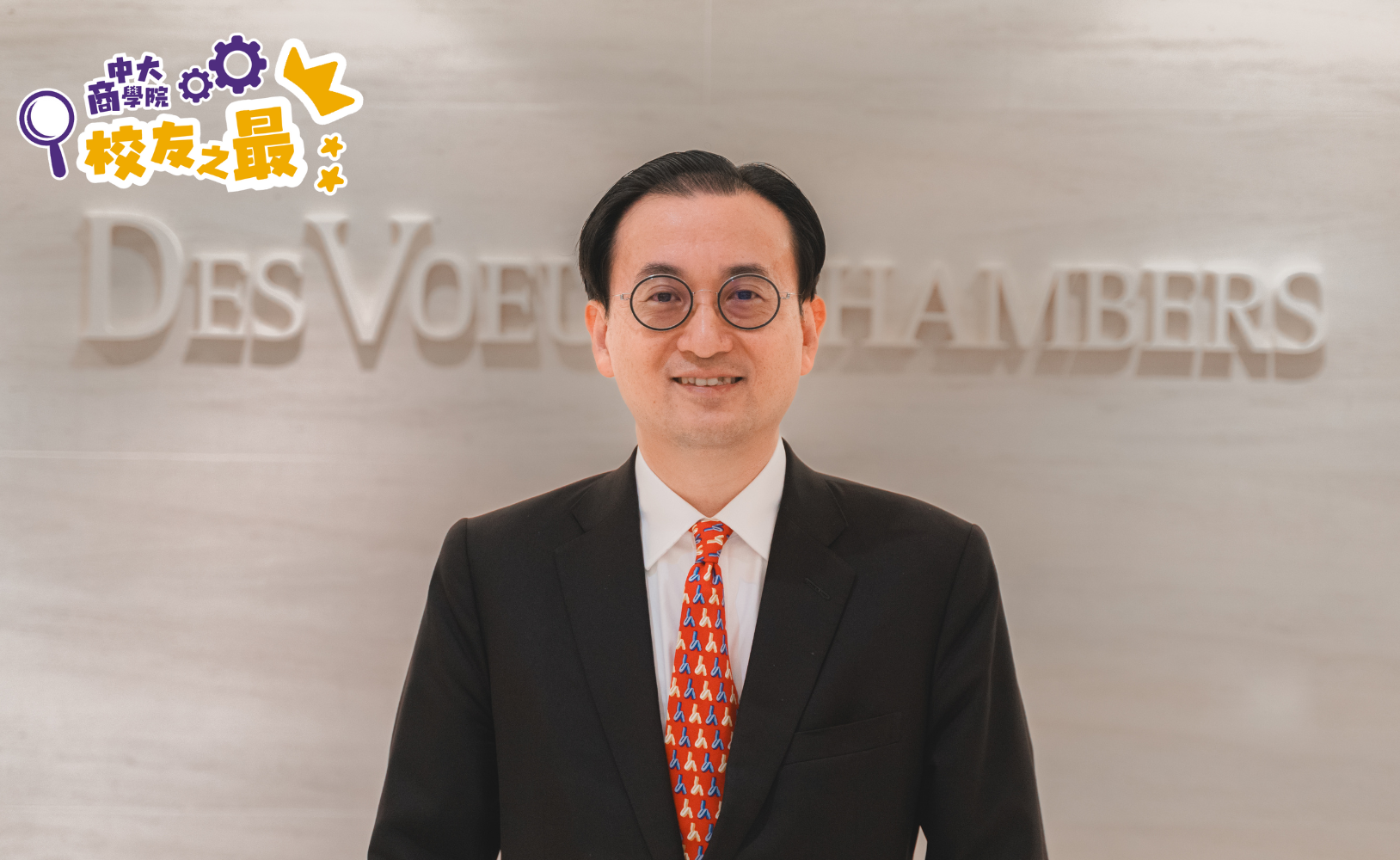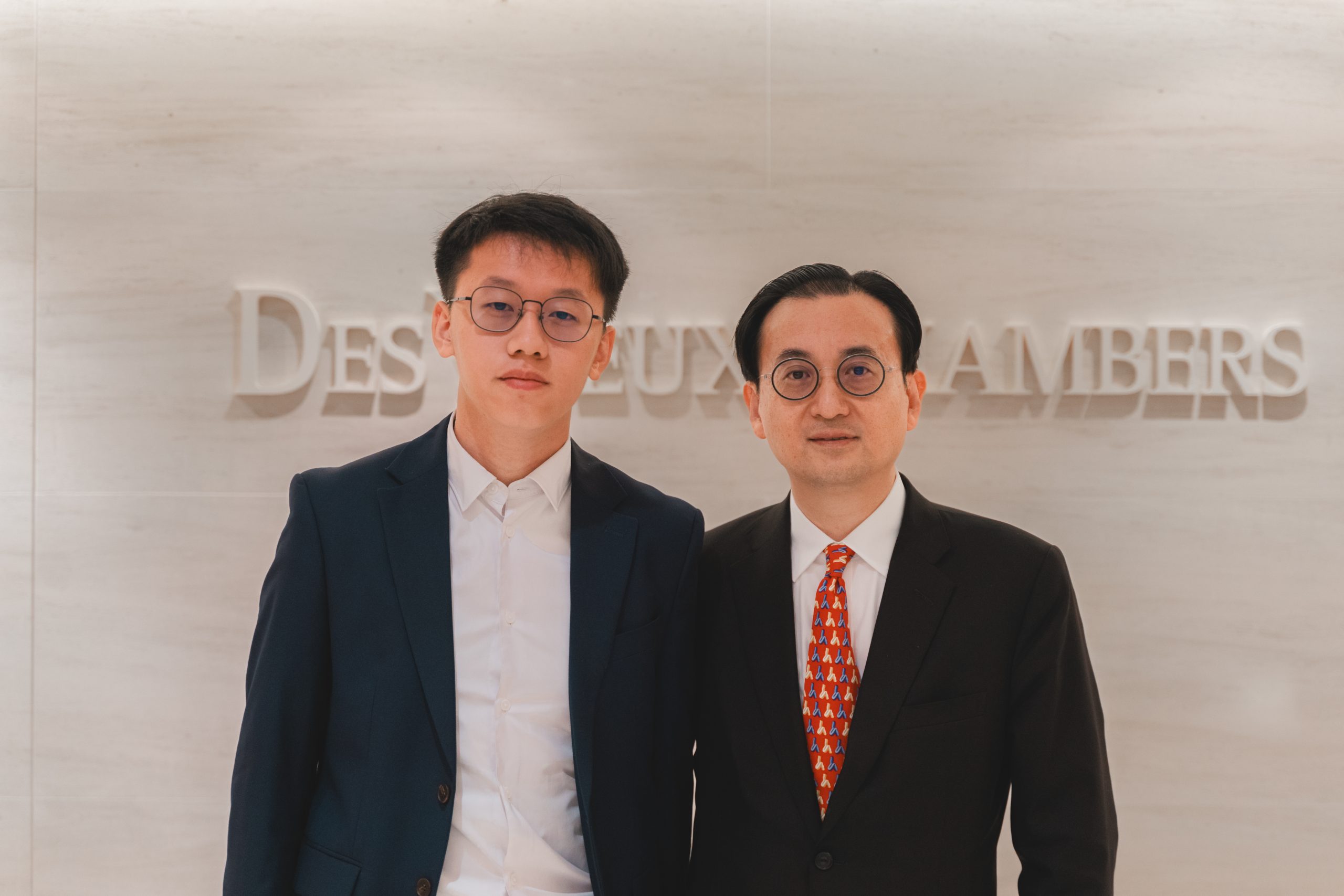【Alumni Hall of Records】Rhodes Scholar William Wong (IBBA 1994) – Living Life One Step at a Time

The Rhodes Scholarship stands as one of the world’s oldest and most prestigious scholarship programmes, bestowing this esteemed honour upon a select group of exceptional young individuals worldwide each year. It has been awarded to numerous Nobel laureates, presidents and Olympians in the past.
CUHK Business School has nurtured three Rhodes Scholar by far, and in this edition of the Alumni Hall of Records, we have the privilege of hosting one of them, Senior Counsel William Wong (IBBA 1994), who will recount how the Business School expanded his horizons and business acumen, forming the foundation for his journey to becoming a respected legal authority in company law. As a lifelong and humble learner, William candidly revealed that his selection as a Rhodes Scholar was not something he actively pursued. Over two decades, he carved out an illustrious legal career, one step at a time. Today, he is ardently championing legal education as a way of giving back. His vision is to help establish Hong Kong as an international arbitration hub, believing that his contribution will be a part of its success.
The seed of studying law sprouted during William’s secondary school days. Instead of directly pursuing law, the determined young man sought a challenge and applied to CUHK’s BBA programme, renowned for its rigor and considered difficult for arts students to enter. He, unsurprisingly, gained entry. William’s university life was vibrant, marked by his participation in the literary club, the debate team and occasional event organising and study trips – activities that sometimes led to him missing classes. He fondly remarked that he was fortunate to have classmates who stood by each other, taking turns attending classes and sharing notes. Thanks to the “cooperative effort”, his academic performance remained commendable.
There were certain classes, however, that William was determined to attend without exception, and among them was the late Prof. Leslie Young’s class on advanced portfolio theory for. According to him, Prof. Young not only imparted financial knowledge but also shared practical skills. “In the very first class, he taught us a portfolio strategy for blue chip stocks, involving selecting both stable and volatile stocks. Many classmates followed his advice and made profitable investments, which helped alleviate their tuition expenses. (How much did you make at the time?) Around HK$40,000.”
 William found Prof. Leslie Young’s classes most memorable as they offered students practical investment experience.
William found Prof. Leslie Young’s classes most memorable as they offered students practical investment experience.
In addition to business training, William delved into various general education subjects such as philosophy, engineering and science. These diverse disciplines not only expanded his outlook but also kindled his passion for reading. He vividly remembered the natural sciences classes taught by former Vice-Chancellor Prof. Charles Kao, where a memorable lesson was imparted. “He once mentioned that even if an experiment fails, it’s still a success because it guides other researchers away from that path and towards a new direction.” William saw the relevance of this principle in life’s endeavours as well.
By the time his year three summer rolled around, William started to feel uncertain about his future path: “During my internship at an investment bank, I sensed I was dedicating my life to the company. The notion of trading time for money left me hesitant; it wasn’t fulfilling.” Fortunately, his affection for law was solidified through two mandatory BBA courses: company law and commercial law. He used the word “fun” four times while describing these subjects during the interview. “We took a thorough study on numerous cases, memorising and analysing them. The process was fun, and securing an ‘A’ was relatively effortless.” He even went to the extent of preparing comprehensive class notes. “The professors would present us with legal problems, challenging us to apply legal principles to solve them.”
Based on the recommendations of his professors, William applied for multiple scholarships, including the Rhodes Scholarship. After a rigorous screening process, he progressed to the final interview round alongside nine other candidates. He confessed that he entered the interview with the goal of gaining experience, assuming he would be the least impressive among the ten contenders. During the interview, each candidate had to take turns leading a group discussion. William was the last to lead and drew the topic of discussing people’s enjoyment of music. “If I had been familiar with the topic, I would have confidently shared my thoughts or presented counterarguments. However, since my knowledge of music was limited, I had to rely on continuously seeking input from others and synthesizing their perspectives.”
The result was announced on the same day, and it was only when the judges approached William and shook his hand that he realised he had been chosen as a Rhodes Scholar. In the years that followed, he discovered that the panel’s evaluation involved assessing candidates’ leadership abilities, communication skills, and collaborative aptitude. While others were eager to voice their perspectives, William took the lead in guiding the discussions and striking a balance between different viewpoints, showcasing his leadership and teamwork. These qualities made him stand out. “I can’t think of any other explanation beyond luck. Everyone worked as hard as I did; it was simply the convergence of circumstances that allowed me to receive this scholarship. I felt the need to remain humble.”
With the scholarship, William studied law at the University of Oxford and completed the three-year programme in just two years. Upon returning to Hong Kong, he embarked on his journey as a barrister, progressing from junior counsel to senior counsel within a remarkably short span of 15 years. While it may appear that he aimed to advance quickly, William attributed his success to having clear goals and consistently pursuing them.
In recent years, William has taken on multiple public roles, such as serving as a member of the Basic Law Committee and a recorder in Hong Kong’s High Court. His motivation to contribute to society drives him in these endeavours. Even in his fifties, he remains steadfast in his commitment to steady advancement. His primary focus lies in promoting the progress of legal education in Hong Kong and the Greater Bay Area, prioritising it over personal wealth. His goal is to establish Hong Kong as an international arbitration centre. “Also, nurturing the next generation and helping them become barristers capable of arguing cases in court at better-than-world-class levels.”
 Timothy, an IBBA Year 2 student, joins the interview with William for his valuable sharing and insights
Timothy, an IBBA Year 2 student, joins the interview with William for his valuable sharing and insights
The Way of the Workplace: Amicable Co-existence
While William is well-acquainted with the courtroom atmosphere of lawyers exchanging sharp words and engaging in passionate debates, the senior counsel earnestly underscored the significance of maintaining a spirit of amicable co-existence.
When discussing workplace dynamics, William stressed three essential qualities. The first is possessing fundamental skills, a slightly elevated IQ and a grounded approach. The second involves the resolve to advance further in one’s career. Lastly, he emphasised the importance of cultivating the ability to peacefully co-exist and collaborate with others in both personal and professional spheres.
“Some people are smart but arrogant and they won’t get very far. On the other hand, being able to live in harmony with others, not allowing anyone to hinder your path, is already a significant achievement.”
CUHK Business School has a proud network of over 40,000 alumni in 49 countries. To explore our inspiring alumni stories, please click here.

